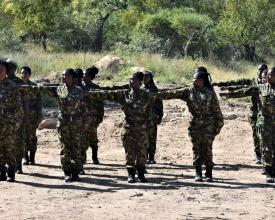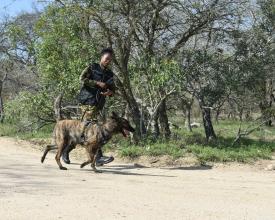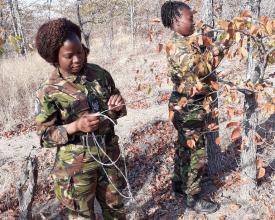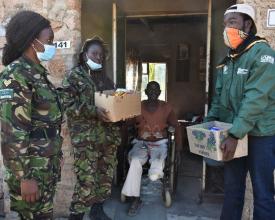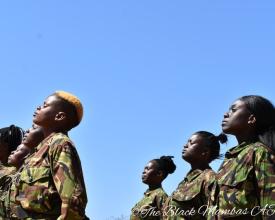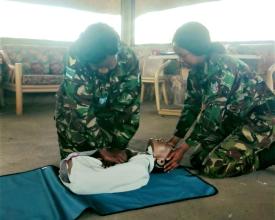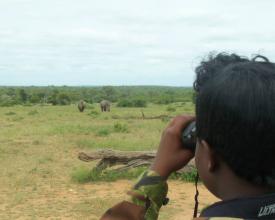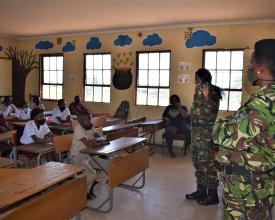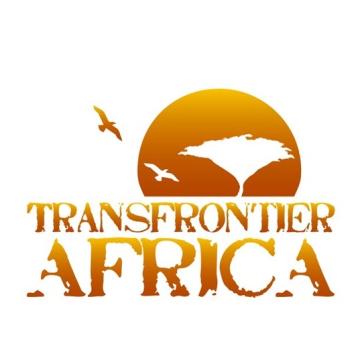
Conservación de la biodiversidad mediante el empoderamiento de las mujeres jóvenes, la mejora de la comunidad y la educación
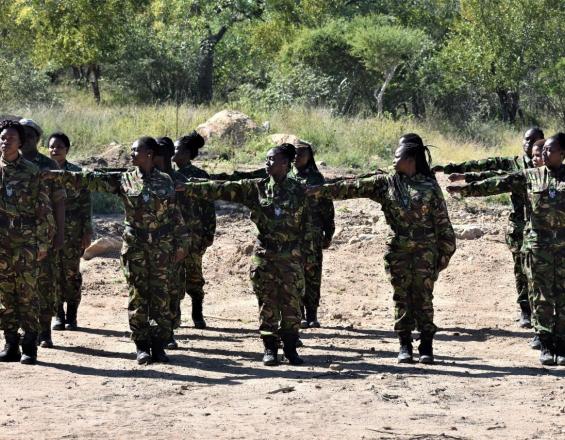
Black Mambas fue una idea de la Reserva de Olifants West para combatir la amenaza de la caza furtiva de rinocerontes. El objetivo es desarrollar un modelo multigeneracional que capacite y eleve a las comunidades para desarrollar el patriotismo medioambiental en las aldeas tribales. Por ello, Olifants West formó a un equipo de mujeres jóvenes de la comunidad local y le dio el nombre de Unidad contra la Caza Furtiva Black Mamba, y poco después el de Programa de Educación Medioambiental Bushbabies. Al principio de la crisis de la caza furtiva de rinocerontes se hizo evidente que las técnicas militarizadas contra la caza furtiva no eran la solución para acabar con ella y crear aliados en las comunidades locales. Mediante el despliegue de mujeres desarmadas como primera línea de defensa en la seguridad de la vida salvaje, la comunidad se ha implicado directamente en la protección de su patrimonio natural. El programa Bushbabies pretende mejorar las condiciones de trabajo de los profesores y crear entornos de aprendizaje estimulantes. Se centra en la educación, el bienestar de los animales, proporciona comidas y se ocupa de cuestiones medioambientales.
Contexto
Défis à relever
Las Mambas Negras tienen un impacto directo a través de la erradicación de la caza furtiva de carne de animales silvestres mediante la retirada de lazos y la destrucción de cocinas de carne de animales silvestres. La caza furtiva de rinocerontes se ha reducido en las zonas de despliegue. Gracias a la vigilancia visual y a la detección precoz, no es deseable entrar en la zona debido al alto riesgo de detección. Gracias a estas intervenciones, Olifants West se ha convertido en una zona indeseable para la caza furtiva. La unidad también vigila las especies en peligro de extinción y las especies invasoras para proporcionar datos para la gestión de la conservación.
Las comunidades rurales pueden volverse vulnerables a la infiltración de sindicatos que reclutan a lugareños para la caza furtiva. Esto provoca un aumento de la delincuencia y crea una falsa economía en la comunidad. Para que las comunidades sean resistentes a esta situación, la educación y la mejora social y económica son fundamentales. A través del proyecto Black Mamba and Bushbabies, la comunidad experimenta el beneficio de proteger la vida salvaje en lugar de explotarla y así protege su patrimonio natural y crea un entorno social y económico más estable.
Ubicación
Procesar
Resumen del proceso
La implicación de la comunidad y la conservación de la fauna van de la mano. Una comunidad empática y fuerte en la frontera del área protegida crea oportunidades para la protección a largo plazo de la flora y la fauna dentro de la reserva, al tiempo que proporciona mejores circunstancias de vida a las comunidades rurales. La población local y los conocimientos tradicionales deben utilizarse en la conservación de la naturaleza para que sea sostenible y proporcione una solución a largo plazo.
Bloques de construcción
Mejora de la comunidad
La mejora de las comunidades es clave para la protección de los espacios naturales. Las comunidades son los custodios del patrimonio natural. Las áreas protegidas deben conectar con las comunidades locales para proteger a largo plazo la flora y la fauna. Mediante la capacitación de las mujeres, la educación, la seguridad alimentaria y el bienestar de los animales, las comunidades mejorarán y verán los beneficios de colaborar con la reserva.
Factores facilitadores
- Creación de empleo en la reserva
- Educación en las escuelas locales
- Proporcionar seguridad alimentaria y agua potable
- Elevar el estatus de las mujeres para que se conviertan en sostén de sus familias
Lección aprendida
Es fundamental comprender las necesidades de las comunidades locales y las posibles diferencias culturales. Es fundamental que el jefe de la tribu participe en todo el proceso. Capacitar al jefe tribal para trabajar con la comunidad y la reserva proporcionará una base sólida para el éxito del programa.
Como aún no existían unidades de guardabosques exclusivamente femeninas, era un reto comprender las diferencias en la mano de obra entre hombres y mujeres. Cómo se acepta a las mujeres en su comunidad como guardabosques, las luchas a las que se enfrentan y las necesidades que puedan tener. Adaptar todo esto para crear una unidad que funcione de forma óptima es un proceso en constante evolución.
Seguridad de la fauna
La seguridad de la fauna salvaje implica algo más que balas y botas sobre el terreno. Las Mambas Negras son la primera línea de defensa. Son los ojos y los oídos de la reserva y están desarmados. La militarización de la seguridad de la fauna salvaje puede crear conflictos entre las comunidades y las áreas protegidas. Aunque las fuerzas armadas son necesarias, es fundamental que se establezca un vínculo entre la comunidad y la reserva a través de guardas que no estén implicados en el lado militarizado de la conservación. El objetivo es crear una plataforma positiva en la que las mujeres sean vistas como modelos para sus familias, los niños de la comunidad y otros miembros de la comunidad.
Factores facilitadores
- Capacitación de mujeres rurales mediante la creación de empleo y el desarrollo de capacidades
- Formación paramilitar y contra la caza furtiva
- Formación en otras materias como conservación, participación comunitaria, educación medioambiental
- Creación de entornos de trabajo seguros y saludables para las guardabosques
Lección aprendida
La presencia de mujeres en el personal puede crear cierta resistencia en las comunidades o entre los gestores de las áreas protegidas, ya que no es la norma. Hará falta perseverancia para demostrar que las mujeres guardabosques son las candidatas ideales para proteger las áreas naturales, ya que tienen un conjunto de aptitudes diferente al de los hombres y es fundamental que se utilicen tanto las aptitudes de los hombres como las de las mujeres. Hará falta tiempo antes de que cambien los puntos de vista y las mujeres rurales puedan convertirse en miembros activos en el ámbito de la seguridad de la vida salvaje.
Capacitación de las mujeres rurales
La promoción de la mujer se consigue mediante:
- Independencia económica
- Aumento de la autoestima y la confianza
- Educación y desarrollo de habilidades
- Convertirse en modelos dentro de la comunidad y a escala internacional.
Factores facilitadores
- Creación de empleo
- Unidad contra la caza furtiva diseñada para atender las necesidades de las mujeres. (cuidado de niños, atención médica, cuidado de mujeres, embarazo, etc.)
- Desarrollo de habilidades (formación continua y cursos)
- Proporcionar a las mujeres un entorno de trabajo seguro en el que prosperen.
Lección aprendida
La lección aprendida del proyecto es cómo integrar a las mujeres rurales en el ámbito de la seguridad de la vida salvaje. Las necesidades son diferentes para hombres y mujeres y hay que tenerlas en cuenta.
Las diferencias culturales pueden influir en el programa, ya que en muchas culturas rurales de África las mujeres no son el sostén de la familia o se espera que se queden en casa. Es importante colaborar con los jefes tribales, las familias y las mujeres para lograr el objetivo de empoderar a las mujeres.
Las mujeres siguen estando muy poco representadas en el ámbito de la seguridad de la vida salvaje y puede que no se las tome en serio como guardabosques. Eliminar el estigma de que las mujeres guardabosques no son capaces de hacer el mismo trabajo que los hombres es una prioridad, y hay que capacitar a las mujeres y darles la oportunidad de participar en la seguridad de la vida salvaje y la conservación de la naturaleza.
Educación de los niños rurales
La educación de los niños de las zonas rurales es fundamental para que la próxima generación sea resistente y participe en la protección de la vida salvaje como patrimonio natural.
Los niños participarán en las escuelas con clases semanales y continuas de educación medioambiental, a la vez que colaboran con otras asignaturas del programa, como inglés, matemáticas, arte, etc., para sacar el máximo provecho de la educación. Las clases de educación medioambiental se centran en enseñanzas básicas sobre el medio ambiente y la conservación de la naturaleza. Se mejoran las escuelas redecorando las aulas para que sean entornos de aprendizaje más cómodos tanto para los profesores como para los alumnos. Los alumnos hacen excursiones a la zona protegida para conocer de primera mano la vida salvaje.
Se ofrecen programas de estudios externos para los niños que deseen continuar después del programa escolar. Estos programas consisten en el programa Scout y en ayudar a los Monitores Medioambientales a mantener limpia la comunidad, ayudar en el cuidado de los animales domésticos y de trabajo y del ganado. Esto no sólo beneficia a los animales a través del cuidado que reciben a través del programa, sino que también enseña a los niños la importancia de cuidar de los animales, lo que se traducirá en la importancia de cuidar de la vida silvestre.
Factores facilitadores
- Escuelas dispuestas a participar en el programa
- Educadores medioambientales de la comunidad local (formados por el programa)
- Estudio del plan de estudios para garantizar el máximo beneficio y los mejores resultados
- Financiación para la mejora de las aulas y los salarios de los educadores medioambientales.
Lección aprendida
El programa ha tenido un gran impacto en los niños en lo que respecta a la importancia de la educación y la protección de los animales y la naturaleza. Ha sido necesario ampliar el programa fuera del horario escolar, ya que muchos niños que terminan la escuela o ya no están en la clase de Bushbabies han querido seguir aprendiendo sobre la naturaleza.
En las comunidades en las que tanto el programa Mambas Negras como Bushbabies están presentes, el impacto positivo en la comunidad ha sido mayor.
Impactos
El Proyecto Mamba Negra ha tenido un gran impacto en la protección de la fauna salvaje. En las zonas de despliegue, la caza furtiva de carne de animales silvestres se ha reducido en un 89% y las incursiones furtivas de rinocerontes en un 62%. Las mujeres son modelos de conducta tanto en sus comunidades como a escala internacional. La Unidad de Lucha contra la Caza Furtiva Mamba Negra es la primera unidad compuesta exclusivamente por mujeres y creó un escenario para ofrecer oportunidades a las mujeres rurales de convertirse en guardabosques a escala internacional. Durante la pandemia, las Mambas Negras identificaron a 90 familias muy afectadas por la pandemia y, gracias a la ayuda de los terratenientes de la Reserva Natural de Olifants West, las Mambas Negras y el Programa Bushbabies entregan mensualmente paquetes de alimentos a estas familias. El Programa de Educación Bushbabies se ha extendido actualmente a 10 escuelas locales y ha llegado a más de 2500 niños en esta etapa. Recientemente se ha creado un centro comunitario para acoger actividades relacionadas con el medio ambiente para niños y jóvenes. La comunidad ha visto el valor de ambos programas y se ha beneficiado a nivel socioeconómico. La reserva se ha beneficiado de la protección de la flora y la fauna que ofrecen los proyectos y de los cambios de comportamiento de la comunidad. Aunque estos proyectos se consideran inversiones a largo plazo, los efectos a corto plazo ya son claramente visibles desde la puesta en marcha de la Unidad de Lucha contra la Caza Furtiva de Black Mamba en 2013.
Beneficiarios
- Reserva Natural de Balule (Gran Kruger)
- 4 comunidades locales limítrofes con la reserva
- Mujeres rurales contratadas de las 4 comunidades y sus familias
- Niños de las comunidades a través de programas en las escuelas y programas extraescolares como los de los scouts
Objetivos de Desarrollo Sostenible
Historia
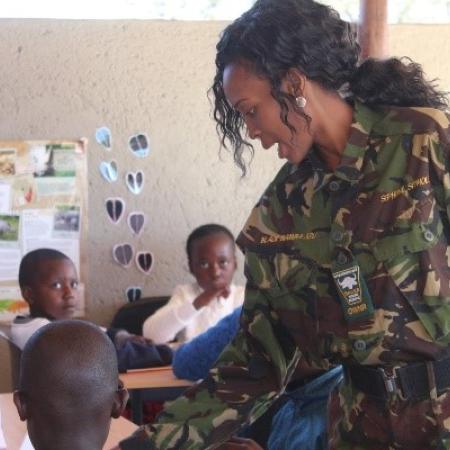
Desde 2013, el Programa Educativo Mambas Negras y Bushbabies ha tenido un impacto en la comunidad local. Las historias de personas inspiradoras han demostrado la importancia de incluir a las comunidades rurales locales en la conservación de las áreas protegidas.
Una de esas historias es la de la guardabosques Leitah, que durante una patrulla con su equipo se topó con una leona con cachorros. Cuando intentaron alejarse de la leona, ella cargó para proteger a sus cachorros. Los Mambas no van armados, así que tendrán que confiar en sus habilidades para protegerse de la peligrosa fauna salvaje. Cuando lograron llegar a salvo a los árboles, consiguieron pedir ayuda para ser rescatadas. Leitah recuerda que estaba aterrorizada, pero más tarde mencionó: "Soy el sostén de mi familia, ¿quién más va a cuidar de ella y quién va a ser la voz de los animales?". Al día siguiente volvía a patrullar y aprendía de la experiencia.
Otro ejemplo del poder del proyecto se produjo cuando falleció una de nuestras sargentas. Era una gran inspiración para las Mambas Negras y para su comunidad. Durante su funeral, las Mambas Negras fueron colocadas en primera fila en señal de respeto. Durante el funeral, la comunidad habló de lo importante que era para ella formar parte de las Mambas Negras y de la pasión que sentía por la protección de la vida salvaje. La comunidad expresó lo inspirada que estaba por su dedicación a la conservación de la vida salvaje y agradeció a la Unidad Mamba Negra las oportunidades ofrecidas a las mujeres.
También los niños de la comunidad han alzado la voz sobre la importancia del programa Bushbabies. La escuela planeaba interrumpir el programa después del primer año, ya que no veían la importancia del mismo. Los niños no lo aceptaron y escribieron cartas al director diciéndole lo mucho que les gustaba el programa y lo mucho que les gustaba aprender sobre la vida salvaje y la naturaleza, y que querían mantener el programa. Orgullosamente, el programa sigue en marcha en esta escuela 8 años después.
El programa Mamba and Bushbabies siempre intentará ayudar a la comunidad. Covid ha afectado a la comunidad y se han perdido puestos de trabajo. Ambos programas dependen mucho de los donantes para poder ayudar, lo que en tiempos de Covid ha sido una lucha. Por suerte, se ha conseguido financiación para contratar a otras 6 mujeres como guardabosques y convertirlas en el sostén de sus familias. Con la financiación adecuada podremos crear más puestos de trabajo para recuperarnos de la pandemia y prosperar en el futuro. La financiación de ambos programas procede principalmente de subvenciones y socios/financiadores
